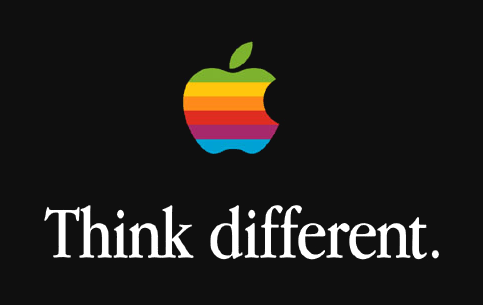I think I now know.
He spent a lot of time explaining how they recruit their staff, train them, measure how well they perform, take action to address problems and how managers are held accountable for the performance of their outlets. But those things, while they’re all very good, are predictable in an organization that’s performing well.
The thing that impressed me was what he told me about his company’s approach. Talking about his company he told me that “we want to be different”. He said he was perfectly happy for all of his competitors to be the same as each other but his company wanted to be unique, different, separate from them. Unashamedly different. That takes a lot of courage.
 |
| Image c/o Wikipedia |
Steve Jobs was a great example of a rule-breaker. He defied assumptions in the technology world and created a brand that differentiated itself from the rest. Apple is now one of the most valuable companies in the world and they achieved that in part by following the advice of that slogan. By unleashing their imagination, by redefining the creative process and by paying obsessive attention to detail they became a market leader. Critics felt they could never win against tech giants like Microsoft but they were quite rapidly proved wrong.
So why can’t you and your company do the same? Why can’t you separate yourself from the “normal” companies and be unconventional?
I’m not suggesting that everyone can be like Apple or Steve Jobs and nor should you perhaps want to. Despite being an astonishing, unique and inspirational character, Steve Jobs was occasionally a ghastly human being. He was unpredictable, rude and unpleasant, none of which are things you or I should ever aspire to be. Despite what some people think, none of these things help a business succeed.
But being different can.
I’m enormously frustrated by some industries where the motivation of most companies seem to be competitive mediocrity. They’re quite content to be no better or worse than their competitors. None of them seem to want to stand out and separate themselves from the rest of the herd. The real frustration is that if one of these companies was prepared to differentiate itself they might be incredibly successful.
I admit that there’s always a risk involved with being different. You might alienate some people. Apple is again a good example of that. Some people just don’t like Apple products. But the ones who do can be fanatically loyal to the brand. Certainly Apple’s current corporate wealth is a good indicator of how successful they’ve become by being different.
It’s not just companies that benefit from being different. You can as well.
Every time we try and recruit a new member of staff we adopt the same approach. We no longer advertise in newspapers, I do it all on Facebook. The message I post is always the same. I explain the nature of the vacancy and then say “Please email us and using fewer than 150 words explain why we should consider employing you.” Every time the experience is the same. About half of the replies are more than 150 words and many of them attach CVs, scanned copies of qualifications, photos of their Omang and driving licence, even sometimes copies of their marriage certificate.
I don’t even read these emails. I’m simply not interested in the them. What I’m looking for are emails that firstly follow the 150-word limit and then ones who stand out from the crowd. I know this might sound pompous but I’m not looking for normal people. I’m looking for people who are abnormal. It doesn’t matter what level they might be, I want people who are different.
Many years ago I learnt a powerful lesson about discrimination. Discrimination isn’t a bad thing. In fact, it can be a good thing. It just depends on the basis for the discrimination. Obviously it’s completely unacceptable to discriminate against people because of their skin colour, religion, gender or sexual orientation but there ARE grounds you can use to discriminate that are acceptable. Talent, experience, resourcefulness and intelligence are all good reasons for recruiting one person and not another.
Discrimination is also good when consumers do it. Again I mean the right sort of discrimination. It’s clearly wrong to avoid companies or stores because of the skin tone of their owners or because of their religion but you really should discriminate between stores because of the quality and prices they offer and also because of the quality of their customer service. That’s all good.
I think life as a consumer would be a lot better if we had more of all of these things. More companies that are willing to be different, more individuals prepared to stand out from the crowd and more consumer discrimination would combine to make our lives a lot better.

No comments:
Post a Comment